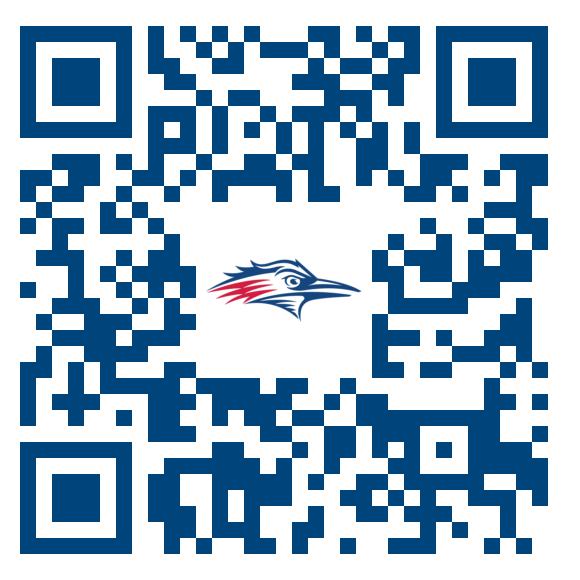CANNABIS CAREERS
CYBER WARRIORS
CONCURRENT ENROLLMENT
MSU Denver prepares students to meet the state’s staggering workforce shortages.


CONCURRENT ENROLLMENT
MSU Denver prepares students to meet the state’s staggering workforce shortages.

SPRING 2023 | red.msudenver.edu
8 Hacking the system for untapped talent
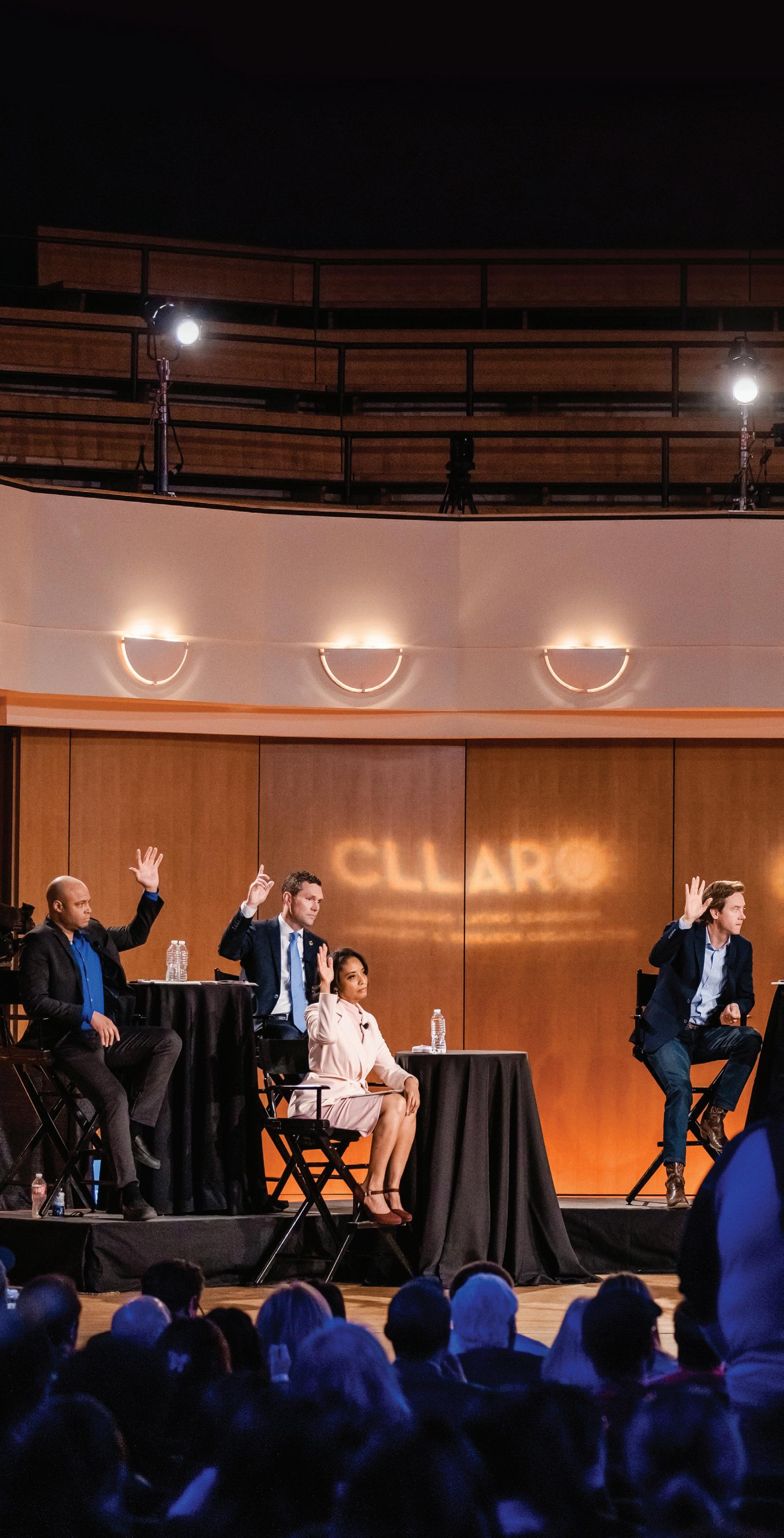
As demand for skilled tech workers grows, MSU Denver program embraces the potential of students with autism.
12 Fast track to success
Students in concurrent-enrollment programs are paying less for college, graduating sooner and excelling in the workforce.
16 No-brainer: investing in future teachers
As Colorado faces a critical shortage of educators, the state is paying student teachers, creating more viable career paths.
2 First word
3 News
20 Power with people
Alumnus Cesar Cedillo is a champion for students from underrepresented communities.
22 Love without borders
Recent grads John and Denise Capelli are partners in life, business and building a better world.
24 Educational equalizer
Alumna Sarah EchoHawk aims to advance access to higher education for Native Americans.
26 Cooking with cannabis
Alumna Shannon Donnelly teaches students the recipe for success in an evolving industry.
28 Roadrunners
29 In memory
32 Motion to succeed
U.S. Rep. Brittany Pettersen is the first Roadrunner to represent Colorado in Congress.
on the cover : Illustration by Marcos Montiel
Candidates in Denver’s crowded mayoral race faced off Feb. 16 on the Auraria Campus, where Metropolitan State University of Denver and 9News hosted the election’s first televised debate. Moderated by 9News journalists, the event featured 13 of the candidates vying to replace outgoing three-term Mayor Michael Hancock. Candidates tackled topics such as public safety, homelessness and the future of downtown. With no candidate receiving more than 50% of the vote in the April 4 municipal election, Kelly Brough and Mike Johnston are headed to a runoff election June 6.
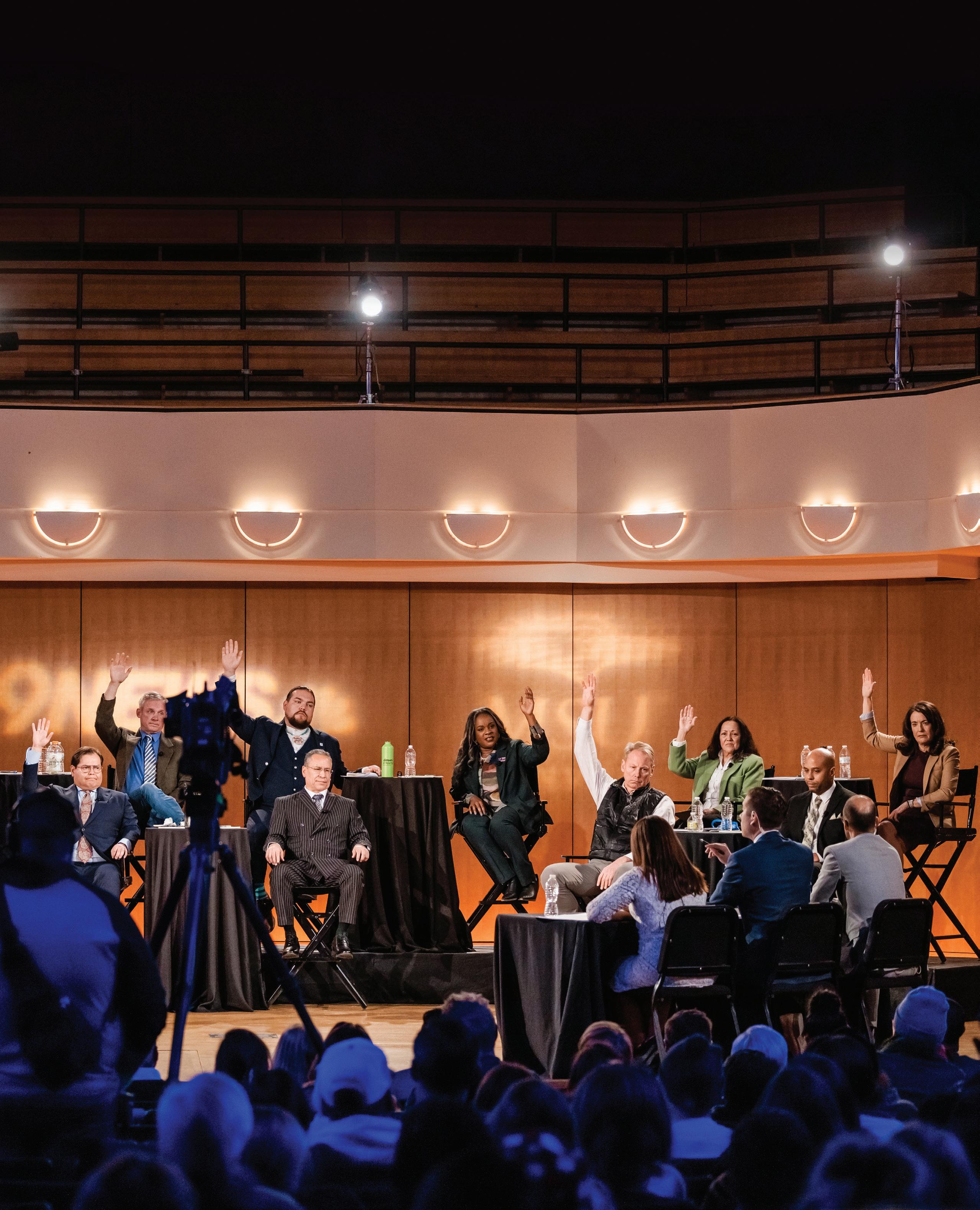
Colorado needs more well-educated workers to meet the needs of the state’s employers. That’s according to the ninth annual Talent Pipeline Report, which found that Colorado had two job openings for every available worker in 2022.
It’s a dilemma that we here at Metropolitan State University of Denver have anticipated for years. For too long, Colorado relied on importing college-educated workers from other places. The lack of state investment in educating its own people has finally come home to roost, resulting in a workforce gap that leaders are now scrambling to plug.
Here’s the good news: MSU Denver is poised to help.
As it has throughout its history, the University is leveraging its innovative, career-focused programs to educate Coloradans to step into the highdemand, often lucrative jobs of today — and tomorrow. We are thankful that state and private organizations have also started to see the value in supporting these programs.
In this issue of RED Magazine, you’ll read about some of the standout programs moving Coloradans — often those from historically underrepresented communities — into the workforce. The University’s growing concurrent-enrollment program, for example, enables high school students to earn college credit before entering higher education. With a head start, these high-achieving students graduate sooner, pay less for college and get into their respective fields faster.
MSU Denver continues to train star educators for Colorado’s schools, in partnership with state government. Last year, state lawmakers approved a bill that created a much-needed student educator stipend program. The
teachers of the future at MSU Denver are now being paid for their required hours of service as student teachers. The stipend has been a boon for the University’s Education students, removing a financial barrier and ensuring that more diverse educators get into the field.
We also recently launched a program designed to train students with autism for jobs in the booming cybersecurity field. Working with a community nonprofit, the University is facilitating learning experiences for neurodiverse students through a combination of customized training and hands-on projects. The students, often discounted as workforce contributors, are set to take the fight to cybercriminals.
Finally, no issue of RED would be complete without highlighting some of the extraordinary Roadrunners already making waves in the workforce. That includes an alumna who is advancing access to higher education for Native Americans and another who is educating students to succeed in jobs in the cannabis industry, among others.
The solution to the state’s workforce shortage couldn’t be clearer: Educate more Coloradans. And MSU Denver is on the job. Thank you for being a partner in our essential work.
Sincerely,
JANINE DAVIDSON, Ph.D. President, Metropolitan State University of Denver
EDITOR-IN-CHIEF
John Arnold
MANAGING EDITOR
Dan Vaccaro
PUBLICATION DESIGNER
Aldrich Design

COPY EDITORS
Marcus Chamberland
Cliff Foster
Leslie Linthicum
EDITORIAL ADVISORY BOARD
Debora Gilliard, professor of Management
Brian Gunther, communications manager, School of Education
Jamie Hurst, assistant vice president of Strategic Engagement
Steve Juliff, communications specialist, School of Hospitality
Laura Miller, managing editor, Communications and Marketing
Sam Ng, professor of Meteorology
Andrea Smith, associate vice president of Strategic Communications
Rob White, director of Athletics Communications
Lynne Winter, assistant director of Advancement Communications
RED Magazine is published by the Metropolitan State University of Denver Office of University Communications and Marketing. © 2023 Metropolitan State University of Denver. All rights reserved. Send correspondence and address updates to magazine@msudenver.edu
The opinions expressed in this magazine do not necessarily reflect the policies and opinions of Metropolitan State University of Denver or imply endorsement by its officers or by the MSU Denver Alumni Association. MSU Denver does not discriminate on the basis of race, color, creed, national origin, sex, age, sexual orientation or disability in admissions or access to, or treatment or employment in, its educational programs or activities.

Rosemarie Allen, Ed.D., has dedicated her life to ensuring that all students have access to high-quality early childhood education. The pioneering Colorado educator’s career achievements were recognized in March when she received the prestigious T. Berry Brazelton Friend of Children Award. Allen joined an impressive list of previous winners who have contributed at the national level to the field of child advocacy. She has taught at Metropolitan State University of Denver since 2004 and focuses her classes on ensuring that teachersin-training are aware of how issues of equity, privilege and power impact teaching practices.
READ MORE about Allen’s impactful career.

With the state facing a critical shortage of skilled health care workers, Metropolitan State University of Denver has embarked on an ambitious plan to expand its capacity to meet the growing demand.
The University has begun work on a new 18,000-square-foot health simulation laboratory that will allow it to train more nurses and other health professionals in facilities that mirror clinical environments.

MSU Denver also aims to construct a 70,000-square-foot health education building that will let the University bring its health-related academic programs under one roof. The new facility, MSU Denver leaders said, would also increase student capacity by an average of 32% in those programs, which currently enroll more than 5,200 students.
“Colorado needs these students in the workforce now more than ever,” said President Janine Davidson, Ph.D., noting that the state had nearly 900,000 unique health care job postings last year, according to a 2022 Talent Pipeline Report. “We need to do everything we can to fill that pipeline.”
In 2018, the University created its Health Institute, a collaboration among 10 academic departments and programs. MSU Denver’s interdisciplinary emphasis is unique, said Emily Matuszewicz, D.C., the Health Institute’s director of Development and Partnerships.
“We’re working not just to build capacity for more students in health fields,” she said, “but to provide those students a better
academic experience across multiple disciplines so that they can become problem-solvers and leaders in the industry.”
While the institute has been in place for five years, a centralized physical space has been harder to come by. MSU Denver is pursuing state and private funding to increase its ability to serve students.
Last year, MSU Denver received $10 million from the state to build the Health Institute Simulation Labs, a renovation of the West Classroom building on the Auraria Campus that will more than double the capacity of the Nursing Department. The University currently turns away about half of its Nursing applicants because of space constraints.

The new simulation facility, on track to be completed by summer 2024, will feature skills labs, simulated hospital rooms, a nurse station and an ambulance bay.
The health education building, known as the Health Institute Tower project, is envisioned as an addition to the aforementioned West Classroom building. The interdisciplinary health facility would include labs and technology that could reduce dependence on scarce clinical placements.
“Getting to practice all of our techniques will help us with knowing patients’ health and keeping patient care a priority,” said MSU Denver student Virginia Navarro, an Exercise Science major who wants to become a physical therapist. “These new labs are really going to help.”
“Colorado needs these students in the workforce now more than ever.”
— JANINE DAVIDSON, PH.D., MSU DENVER PRESIDENT
MSU Denver doesn’t want to merely plug vacancies in Colorado’s health care fields; it wants to fill them with workers who reflect the communities they serve. The Health Institute offers robust financial aid and support services to attract students from underserved communities.

“There’s more and more evidence telling us that when a provider looks like the patient, or when a provider has some lived experience connected to that patient … you have better health outcomes,” Matuszewicz said. “Colorado is a largely medically underserved state, so we’re trying to serve as many health care students as possible.”

Plans to expand health education at Metropolitan State University of Denver got a big boost in January, thanks to a “transformational gift” by the CEO of a leading financial institution.
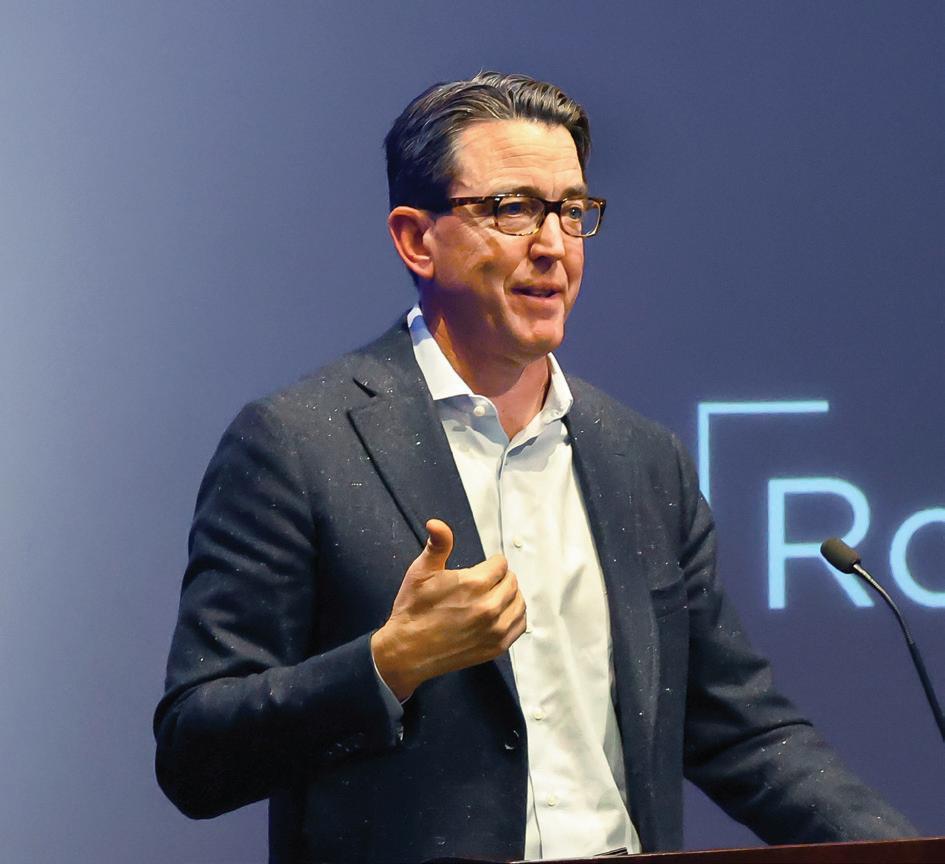
Financial support from Mariner and Megan Kemper, the Kemper family and the UMB Financial Corp. Charitable Foundation will help MSU Denver kick off a capital campaign to construct a 70,000-square-foot facility housing the University’s Health Institute, which aims to bolster the state’s health care workforce.
The three-part gift will also seed an endowed deanship for the new College of Health and Human Sciences and support the construction of the University’s Classroom to Career Hub (C2 Hub).
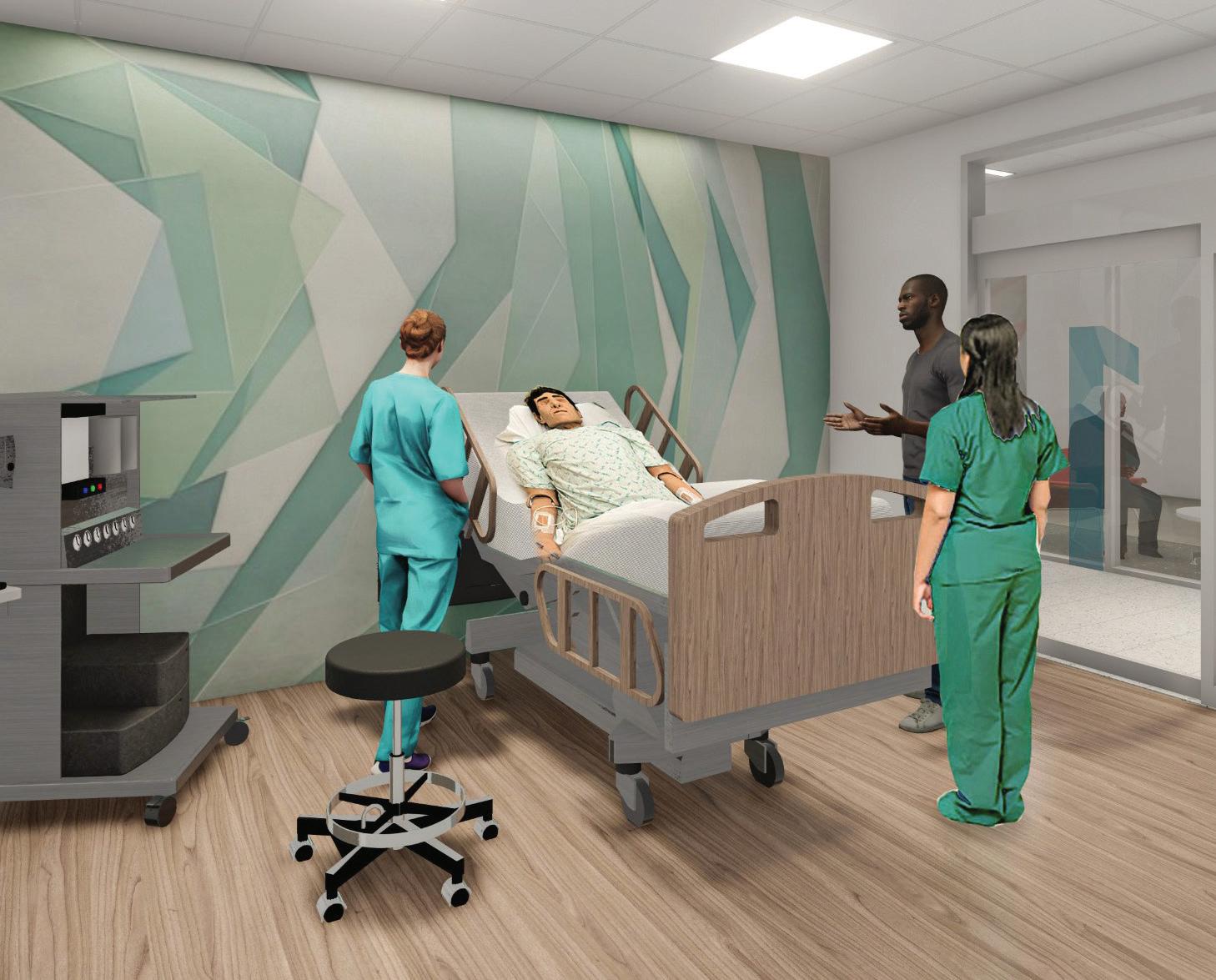
Mariner Kemper, president and CEO of UMB Financial Corp., and his wife, Megan, have been supportive of MSU Denver’s mission for years, but their recent gift is “truly special,” said President Janine Davidson, Ph.D.
“Megan and I believe in higher education — it’s the key to changing lives,” Mariner Kemper said. “We are excited to invest in MSU Denver because it not only offers an accessible education; it offers a high-quality educational experience. MSU Denver is so important because it focuses on serving Colorado students who will likely stay in our state and serve our community.”
Metropolitan State University of Denver paid tribute to late, great trumpeter and cornetist Ron Miles with a Feb. 10 concert featuring the musicians who played with Miles on his 2020 Blue Note debut “Rainbow Sign.”

The album, influenced by the death of Miles’ father, explores metaphorical connections made by rainbows — “this idea of rainbows being a highway from heaven to earth,” as Miles put it.
Acclaimed guitarist Bill Frisell, pianist Jason Moran, bassist Thomas Morgan and drummer Brian Blade (pictured) took the stage at the King Performing Arts Center for a show that benefited the newly established Ron Miles Endowed Scholarship. The fund was created
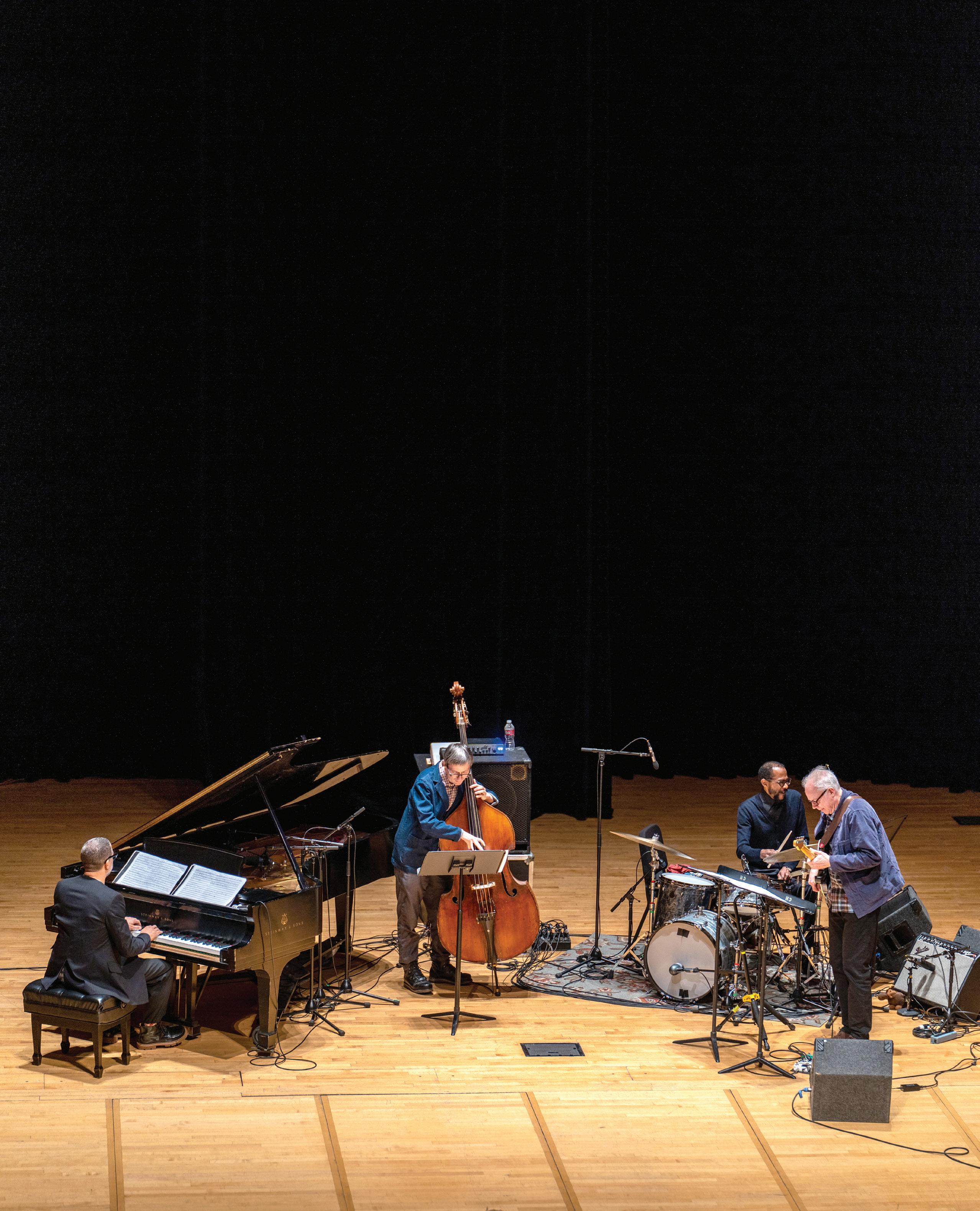
after Miles’ death in 2022 to support aspiring jazz musicians at MSU Denver, especially those who come from underserved communities.
“We knew that Ron wanted to create a scholarship,” said Peter Schimpf, Ph.D., chair of the University’s Department of Music, who noted the Grammy-nominated musician’s passion for mentoring students, whether they were experienced performers or beginners. “That was our first priority, to get one up and running in his name.
“Ron’s legacy is his humility in music and in teaching. It was remarkable that someone
of his stature and playing around the world would give (students) all the same amount of time.”
The memorial concert was part of the three-day Mile High Jazz Festival, in which music students from high schools across the state gathered on the Auraria Campus to perform and take part in workshops. MSU Denver has hosted the festival, now in its 58th year, since 2019.
The Feb. 10 concert honoring Miles featured “top shelf” jazz, Schimpf said.
“Not only are the performers people who played with Ron; some are living legends of jazz,” he added. “And to have the concert feature Ron’s music in honor of Ron is amazing.”
Civil rights trailblazer Carlotta Walls LaNier spoke at Metropolitan State University of Denver’s Martin Luther King Jr. Peace Breakfast on Jan. 13.

LaNier was the youngest member of the Little Rock Nine, the first Black students to integrate Little Rock Central High School in 1957, three years after the landmark Brown v. Board of Education Supreme Court ruling.
She traces her belief in the value of education to her great-great-grandfather, Hiram Holloway, who in his youth witnessed people being auctioned off for slavery in Florida and Georgia. He later told his story for President Franklin Roosevelt’s Federal Writers’ Project, a Depression-era initiative that included the Slave Narrative Collection.
“He was a well-read person and always stated how important it was to be educated,” said LaNier. “(Education) opens doors of opportunity
everyone should have access to.”
LaNier, who has championed educational access throughout her life, delivered the keynote address at the 2023 MLK Peace Breakfast, which was themed “Liberation Through Education: Decolonizing Systems of Power.” The annual event celebrates King’s legacy and honors individuals who keep his spirit alive. This year’s MLK Peace Award winners included laudable community members Allison Cotton, Ph.D.; Miguel Huerta; Gregor Mieder; Dwinita Mosby Tyler, Ph.D.; and Mariana Pascual-Miranda.
Though LaNier faced persistent bigotry during the time of integration, she remained steadfast in her commitment to education — even after her house was bombed in 1960.
Metropolitan State University of Denver is launching a new effort to grow and diversify Denver’s teacher workforce with the help of a $1.5 million federal grant.
MSU Denver’s School of Education is one of 12 institutions nationwide to receive funding from the Augustus F. Hawkins Centers of Excellence Program, which aims to support more teachers from historically underrepresented populations by expanding teacher-preparation programs at Minority-Serving Institutions.
The University will use the grant, managed by the U.S. Department of Education, to provide 15 scholarships per semester to paraprofessionals already working in Denver Public Schools high-needs schools, especially those in underserved and Spanish-speaking communities. Paraprofessionals provide instructional support under the supervision of licensed teachers.
“MSU Denver wants to help paraprofessionals become licensed teachers themselves,” said Christine Muldoon, Ed.D., executive director of the University’s Office of Education Solutions. “They’re already working in the school district, so there’s a huge opportunity here. But what we know is that it’s not enough just to bring students here. We need to support them while they’re here.”
LaNier sees MSU Denver as a bright spot in the Colorado educational landscape, noting the Board of Trustees’ commitment to diversity. With her speech at the University, she reconnected with the spirit of her great-great-grandfather’s words.
“It takes all of us to learn what brought us to become the best country in the world in the first place, and education plays a central role,” she said.
$1.5 million
Federal grant to support more teachers from historically underrepresented populations.
The four-year grant will bolster those support services, including more in-class and out-of-class faculty support and the creation of support groups that foster a sense of belonging. The University also plans to expand its Bilingual Education Specialist certificate program with the help of Hawkins grant funding.
“Today, more than half of our learners nationwide are students of color, and yet fewer than one in five educators come from communities of color,” said U.S. Secretary of Education Miguel Cardona, Ph.D., in a statement. “I’ll never forget the impact that my first teacher of color had on me as a student, and my experience tracks closely with years of research suggesting the profound, positive influence that educators of color have on students of all backgrounds.”
“I’ll never forget the impact that my first teacher of color had on me as a student.”
— MIGUEL CARDONA, PH.D., U.S. SECRETARY OF EDUCATIONSARA HERTWIG Carlotta Walls LaNier delivers the MLK Peace Breakfast keynote address in the Tivoli Turnhalle on Jan. 13.
AS DEMAND FOR SKILLED TECH WORKERS GROWS, MSU DENVER PROGRAM EMBRACES THE POTENTIAL OF STUDENTS WITH AUTISM.

 BY MARK COX
PHOTOS BY ALYSON M c CLARAN
BY MARK COX
PHOTOS BY ALYSON M c CLARAN
ost people know that Albert Einstein and Isaac Newton made incredible scientific and technological contributions to the world. Far fewer people, however, know they were both likely autistic.
Throughout history, there has often been a connection between scientific achievement and neurodiversity.
Experts believe that many historical figures, including computing legend Alan Turing and electricity innovator Nikola Tesla, probably had an autism-spectrum disorder.
With the U.S. facing a growing threat from online attacks, cybersecurity educators are considering afresh the contribution that the neurodiverse community could bring to this new technological frontier.
Enter Metropolitan State University of Denver, which is working in partnership with Teaching the Autism Community Trades to prepare neurodiverse students for careers in tackling hackers.
In the University’s Cybersecurity Center, students with autism have been learning this complex field through a combination of customized training and hands-on experience.

“Cyber analysis focuses exclusively on gray areas,” said Richard Mac Namee, director of the Cyber Range at MSU Denver. “Nothing is black or white, and there’s no manual to work from.”
Information-security analysts, he explained, need an inquisitive nature, keen attention to detail and, above all, an ability to follow leads to the end.
In his experience, Mac Namee has found that some neurodiverse people are able to remain extremely focused. They can also be exhaustively methodical and work relentlessly until they find the problem — or conclude that there isn’t one, he added.
Connecting the neurodiverse with cyber careers isn’t an entirely new idea. In the United Kingdom, the British spy agency Government Communications Headquarters has for years embraced the hiring of neurodiverse employees.
“I’m trying to replicate that model here,” said Mac Namee, a former British Army officer. “Because we know it works.”
One thing is for sure: There’s plenty of cybersecurity work. According to the U.S. Bureau of Labor Statistics, demand for information-security analysts is set to grow by 33% from 2020 to 2030 — four times faster than the average growth rate for all other occupations.
Why the hiring surge? Cyberattacks and data breaches cost jawdropping sums: The global cost of cybercrime is predicted to reach $8 trillion this year.
And Steve Beaty, Ph.D., professor of Computer Sciences at MSU Denver, said that figure is likely an underestimate. “It’s difficult to estimate a true cost of cyberattacks because, besides the direct financial hit, they bring so many other deficits, such as the loss of reputation, lawsuits and employee productivity,” he said.
Meanwhile, the U.S. government and businesses have been struggling to defend against increasingly sophisticated hackers and data miners. Small and medium-size businesses, which are victims of almost half
of all cyberattacks, are particularly underprepared. Technology firm Accenture says only 14% of them have any defensive measures at all.
“The first challenge is to even detect a cyberattack, which is often difficult because advanced persistent threats can literally lay in wait for years,” Beaty said.
Advocates of the Teaching the Autism Community Trades cybersecurity course said it addresses two problems at once: finding talented employees to bolster cyber defenses while addressing the chronic underemployment of neurodiverse people.
Cybersecurity students such as Matt G. Barr are eager to join that job market.
“I was interested in this opportunity because I wanted to learn new skills that could help me with a potential future career path in cybersecurity,” he said. “It gave me something new to try out, as well as valuable experience.”
While the program is a boost to MSU Denver’s mission to empower underrepresented groups, it also upends prejudices about the value and reliability of people on the autism spectrum, Mac Namee said.
“This project is personal for me because I’ve seen the value of neurodiversity in analysis during my own military career,” he said.
“So when I saw this constituency of talented people not being given employment because they are — incorrectly — seen as problematic, I thought: We can change that.”
Across the U.S., neurodiversity rates continue to surge. One in every 36 children in the country has been diagnosed with an autism-spectrum disorder, according to the U.S. Centers for Disease Control and Prevention. That makes MSU Denver’s partnership with Teaching the Autism Community Trades feel particularly important.
Before teaching the course, faculty members had to undergo extensive training in how to instruct a neurodiverse class. MSU Denver
also got invaluable help with the course from another partner organization, the Public Infrastructure Security Cyber Education System, known as PISCES.
This innovative nonprofit prepares students for cyber-analyst careers by immersing them in real-world experiences, working with reams of live data and malicious threats.

Another key priority for the course was to make sure these future cyber warriors, some of whom can struggle with social settings, would successfully integrate into a collegiate work environment.
The first step was to make sure the students always worked in groups. “We deliberately bunched up around a table and studied together,” Mac Namee said, “rather than sitting at separate desks, just to get everyone used to the idea of collaborating.”
Gradually, the group grew accustomed to this way of working. Mac Namee noted that the collaborative aspect is especially important in a field where good teamwork is critical.
Mac Namee is confident that a bright future is ahead for most of the students who participated in the first Teaching the Autism Community Trades course. “Smart companies are going to recognize that these gifted people really are an invaluable asset,” he said.
But the course isn’t just about gaining technical and academic accomplishments. For these students, a career in cybersecurity could also make a transformative personal difference, bringing them confidence, financial independence and a true sense of place in the world.
“Knowing how important cybersecurity is to the world, this project makes me excited for the future,” said Gavin West, a student in the course. “It makes me feel like I’ll be able to make a difference with my career.”
STUDENTS IN CONCURRENT-ENROLLMENT PROGRAMS ARE PAYING LESS FOR COLLEGE, GRADUATING SOONER AND EXCELLING IN THE WORKFORCE.
BY JOHN ARNOLD PHOTOS BY ALYSON M c CLARANWhen she learned she
Now 17, the east Denver resident is on track to earn her high school diploma and bachelor’s degree from Metropolitan State University of Denver simultaneously next fall.
“College was always the goal,” said Smith, an Environmental Science major. “My mom is very excited about (graduation) as well because I’m the first in my family to go to college. But the challenge was finding a means to pay for it.”
Smith is among a growing number of students participating in concurrent-enrollment programs, also known as dual enrollment. These programs offer students a chance to earn college credit while still in high school, with their college tuition often paid by school districts or the State of Colorado.
More than 90% of high schools in the state offer such programs, with an annual growth rate of 16% statewide through the 2019-20 school year (the latest available data from the Colorado Department of Education). At MSU Denver, the number of students participating in concurrent enrollment is soaring. Enrollments increased by 49% in 2021-22 over the previous academic year. So far this school year, the University has enrolled 1,327 high school students, with summer class registrations still pending.
In elementary school, Mattie Smith was a perfectionist — a straight-A student with an interest in the environment and biology. Scientific curiosity and academic success followed her to Montbello High School, where she scored well on a collegereadiness test that assesses reading, writing and math skills.
could take college courses as a high school student, she jumped at the chance.
“College was always the goal.”
— MATTIE SMITH
“The cost of college fuels this growth,” said Jess Buckmaster, senior manager of MSU Denver’s College Credit in High School programs. “We enroll a lot of first-generation students who don’t think college is an option, because of the cost. But they find out that they can take these classes while in high school, at no cost, and they say, ‘Oh, I can do this now, and it’s paid for.’”
As interest in concurrent enrollment has grown, so have options for high school students. They can take courses at their schools, on MSU Denver’s campus or online. For those whose districts don’t pay for college courses, the University offers a discounted tuition rate. The University also recently set up a statewide concurrent-enrollment virtual network, which expands program access to students in rural and underserved school districts.
Meanwhile, the State of Colorado has expanded a program that allows students to continue concurrent enrollment beyond 12th grade at participating higher education institutions. Eligible students can enroll in the Accelerating Students Through Concurrent Enrollment (ASCENT) program and continue their college studies, paid for by the state, for an additional year.
With the program expansion, the number of ASCENT students at MSU Denver grew by 45% year over year, from 82 students in fall 2021 to 119 in fall 2022.


“The state has recognized that concurrent enrollment is something that works,” said Terry Bower, associate vice president of Innovative and Lifelong Learning at MSU Denver. “We’re giving students who might not otherwise have an opportunity for a college education a head start on advancing their lives, while bolstering Colorado’s workforce.”
Smith and Montbello classmate Nikia Parker, both ASCENT students, began taking college courses at their high school through Community College of Aurora. They earned credits in courses such as English, History and Communications and transferred them to MSU Denver, where they began taking higher-level and more specialized classes.
Smith enrolled in three geography- and science-related summer courses at the University following her sophomore year in high school. Parker, meanwhile, pursued her passion for art and design, ultimately majoring in Communication Design.
“The workload with the General Studies classes was bearable,” said Parker, who like Smith is on track to receive a diploma and
bachelor’s degree next fall. “Now, as a senior, it’s much more work. But it’s totally worth it.”
While some high school students begin taking college courses as early as their freshman year, most begin in their sophomore or junior year and enroll full or part time in college following high school graduation, said Buckmaster, who was recently appointed to serve on a board that advises Colorado’s Education Department on how to grow and improve concurrent enrollment in the state.
These students not only get a jump on accruing college credits; they can begin exploring potential career interests, she added.
MSU Denver’s concurrent-enrollment offerings include some of the University’s most popular areas of study, such as Aviation, Advanced Manufacturing, Health Care, Criminal Justice, Industrial Design, Liberal Arts and more.

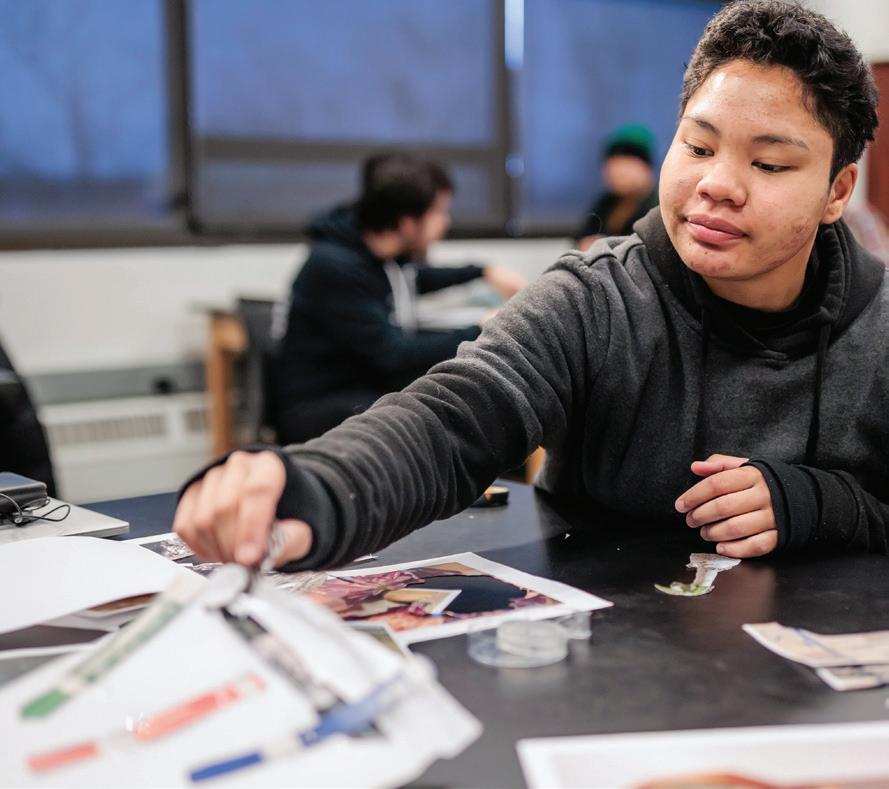
State data shows that those who participate in concurrentenrollment programs are more likely to earn a college degree and have higher workforce earnings once they do.
“The benefits of concurrent-enrollment programs are amazing,” said Karen Marie Jaramillo, a lecturer in MSU Denver’s Chicana/o Studies Department who also teaches concurrent-enrollment classes at Denver’s West High School, her alma mater.
Jaramillo became a young mother after high school and spent years working toward her bachelor’s degree, eventually earning one from MSU Denver in 2006 in Chicana/o Studies. She later got two master’s degrees. And she’s not finished.
“I’ve been in school for 40 years and will soon be earning my doctorate,” she said. “Had something like concurrent enrollment been available when I was in high school, it wouldn’t have taken 40 years. I share this with my students. Everyone’s journey takes them in a different direction.”

For Smith and Parker, that journey has led to MSU Denver. They’ve completed all requirements to earn their high school diplomas and now take multiple classes a day on the Auraria Campus. Many of their MSU Denver classmates and professors don’t know that they’re still technically high school students.
“Sometimes, I’ll get invited to have drinks after class and I just let them know I can’t. Not for another four years,” Smith said. “I get some surprised looks.”
Smith and Parker are considering their post-graduation options, including whether to pursue advanced degrees or start their careers. Smith is interested in working in hydrology, agriculture or environmental restoration. Parker has her sights set on the design field.
Both students said they were happy with their decision to pursue such a fast track to a college degree. But they admit that finding a school/life balance was tough at times, and they urge others considering similar paths to weigh their options and consider the pace that works best for them.
“There’s a lot of work, but there’s a lot of flexibility,” said Smith, the elementary school perfectionist who continues to earn mostly A’s.
“I got a ‘B’ last semester, and there were a few tears,” Smith said with a laugh. “But I’m definitely happy I did this. Even beyond the financial benefits, getting a head start is a fantastic motive.”
“We’re giving students who might not otherwise have an opportunity for a college education a head start on advancing their lives, while bolstering Colorado’s workforce.”
— TERRY BOWER, ASSOCIATE VICE PRESIDENT OF INNOVATIVE AND LIFELONG LEARNING ATMSU DENVER Nikia Parker at work in a Communication Design class. HOW TO get a head start:


AS COLORADO FACES A CRITICAL SHORTAGE OF EDUCATORS, THE STATE IS PAYING STUDENT TEACHERS, CREATING MORE VIABLE CAREER PATHS.
BY AMANDA LOUDIN | PHOTOS BY ALYSON M c CLARANHE STATISTICS ARE GRIM: Eighty-five percent of state educators say the shortage of classroom teachers is worse than in previous years, and 90% say the same about support staff. Sixty percent of teachers say they are considering leaving the profession soon. All of these numbers emerged from a 2022 survey conducted by the Colorado Education Association.
Their sentiments aren’t off the mark, either. More than 3,300 teaching positions in Colorado were vacant at the end of the last school year. If there’s an upside to the depressing statistics, however, it’s that Colorado’s legislature recognizes that the teaching profession is in trouble and is working to create a pipeline of new educators. Last year, lawmakers and Gov. Jared Polis approved the Removing Barriers to Educator Preparation bill, which created a student educator stipend program.
Unlike other apprenticeships — in cooking, cosmetology, even tattooing — student teachers weren’t paid during their student-teaching residencies. The new program now pays them $11,000 for 16-week residencies and $22,000 for 32-week residencies. And the impact is already apparent at Metropolitan State University of Denver, where nearly 80 Education students are reaping the benefits.
Amber Osborn, who plans to graduate in May, is one of them. She received a $22,000 stipend spread out over her final two semesters and said she might not have remained in the program without it.

— ELIZABETH HINDE, PH.D., DEAN, SCHOOL OF EDUCATION
“This is putting more teachers in the classroom who otherwise would have quit. It is a gamechanger for teaching.”
“It was definitely a question as to whether or not I could work full time student-teaching plus another job in order to get by,” she said. “Teaching drains you, and I can’t imagine going to (another) job after a full day.”
Osborn is the daughter of a teacher and didn’t grow up thinking she would pursue the same path. But after working as a paraeducator in her mother’s school, she changed course. Now, she’s student-teaching in her hometown of Aurora. “I love my community here, and it’s nice to have the opportunity to teach here,” she said. “I’m incredibly thankful for the stipend allowing me to do it.”
Similarly, James VanHatten, a 50-year-old Army veteran and career information technology professional, said the stipend made it possible for him to switch careers.
“I became disillusioned with corporate life and realized I needed a job where I could make a difference,” he said. “I started substitute-teaching and decided it was the right path for me.”
VanHatten is a single father, however, and the idea of student-teaching, raising a son and having no source of income made a teaching career appear out of reach. “I’m not sure how I would have finished my last semester without the stipend,” he said.
Having graduated in December, VanHatten is working as a long-term substitute with Littleton Public Schools, teaching middle school electives. He hopes for a permanent position next year. “I needed the stipend and took advantage of it,” he said. “It was a lifesaver.”
The School of Education at MSU Denver is the second-largest teacher-preparation program in the state, behind only the University of Northern Colorado. Dean Elizabeth Hinde, Ph.D., is well aware of the sobering realities of trying to become a teacher.

“When it comes to student-teaching, we’re asking these students to work three to five days a week without a source of income,” she said. “They just can’t do it.”
Hinde has heard from numerous students who have dropped out of the program for that reason. The stipend, however, is making a difference. She noted that 77 education students were eligible for the stipend last semester. With another bill coming up to expand eligibility, the school could have close to 90 students in the near future.
When students were surveyed about how they used the stipend, Hinde said the top two responses were for rent and food. Some recipients said the stipend gave them the motivation to continue in the program.
The bill has the potential for another impact as well: diversifying a homogeneous teaching force. “The bill was specifically targeted to underrepresented populations,” Hinde said. “The financial barriers to first-generation students and students of color are significantly higher than their white counterparts.”
Right now, the bill has funding for two years, mostly from the federal government. But education deans such as Hinde are working to make the funding permanent.
“We’re trying to make it part of the state budget so that it lasts forever,” she said. “This is putting more teachers in the classroom who otherwise would have quit. It is a gamechanger for teaching.”
Osborn and VanHatten agree and can look ahead to full-time careers as educators in the state. They encourage others to follow in their footsteps.
“It’s about time there was a program like this,” said VanHatten. “If you qualify for the program, go for it.”
“I’m incredibly thankful for the stipend.”
— AMBER OSBORN, EDUCATION STUDENT
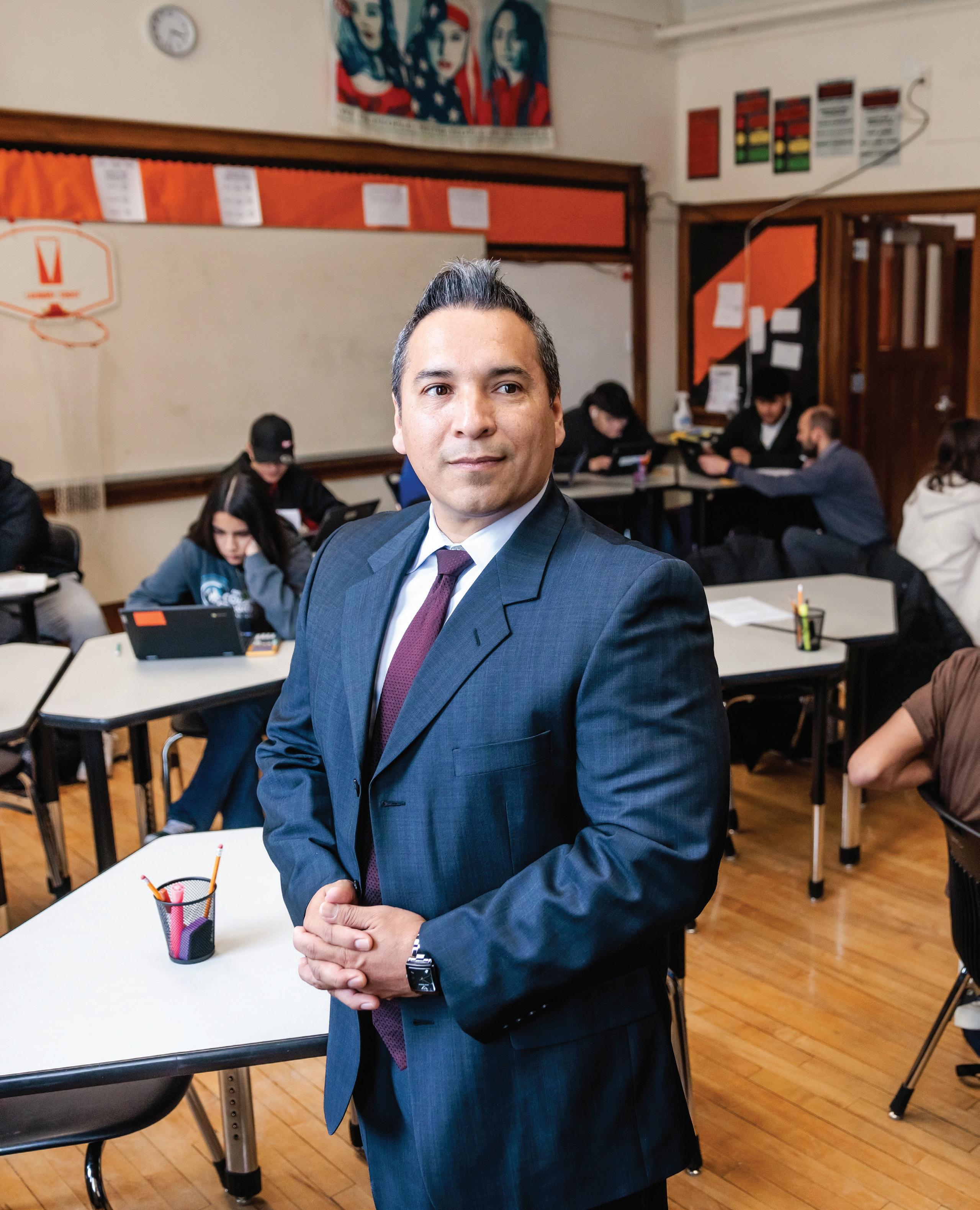
Cesar Cedillo arrived in the United States from Mexico when he was 8 years old. As a second-grader in Denver Public Schools, he had to learn English and navigate an unfamiliar environment.
“That’s why I got into teaching,” said Cedillo, who earned a History degree with a teaching certificate from Metropolitan State University of Denver. “I want to be that champion for students facing the same challenges.”

Cedillo has become that champion. As the chief of schools for DPS, his big-picture priority has been to ensure that students — especially those from underrepresented communities — feel welcomed. He’s also focused on supporting principals and teachers.
Those tasks come at a difficult time, as local educators and families face unprecedented challenges due to the Covid-19 pandemic. “Attendance is down nationally. Self-harm is up considerably,” Cedillo said. “I want to work to put systems and resources in place to change that paradigm.”
Like many public school districts, DPS has experienced an enrollment decline, which leaders attribute to falling birth rates, high costs of living and the effects of the pandemic. Among the solutions being considered by administrators is closing schools.
Cedillo is no stranger to potential closures. As assistant principal at Bruce Randolph Middle School, he worked with then-Principal Kristin Waters to save the school from shutdown. Under the duo’s leadership, the school (now known as Bruce Randolph School) went from being among the worst-performing in Colorado to graduating 97% of its first senior class in 2010. Their efforts were recognized by then-President Barack Obama in his 2011 State of the Union address.
As chief of schools, Cedillo is charged with ensuring that principals have the resources they need. He draws on his experiences as a student, educator and principal to develop systems that promote cohesiveness and success.
“The way I approach this job is to always be a humble leader,” he said. “When people know that you leave the ego at the door, it means you’re wanting to be part of the solution.
“When we’re having tough conversations, the trust is always there — they’re never trying to second-guess what I’m trying to get over to them. It’s power with rather than power over people.”
ALUMNUS CESAR CEDILLO IS A CHAMPION FOR STUDENTS FROM UNDERREPRESENTED COMMUNITIES.
When a photographer and florist met at a wedding, an unexpected love story bloomed.
John and Denise Capelli, a wedding photographer and a florist, respectively, launched a business in Denver in 2001. Fourteen years later, after Denise’s recovery from a life-threatening disease, they reached a turning point, ultimately deciding to join the Peace Corps and return to school.
They graduated from Metropolitan State University of Denver in December. John, 55, received a degree in Global Business. And Denise, 48, earned a degree in Communication Studies. They’re now volunteering with fellow former Peace Corps workers to organize support for communities in Ukraine.
“We want to share the new tools we gained from MSU Denver to help build a better world,” Denise said.
The couple met in 1999 at the wedding of Denise’s sister. Denise was pulling double duty as the florist and a bridesmaid while John handled the photography. A few days later, they set up a business meeting to see how they could refer each other’s services, and the meeting turned into a date.
They married in 2001 and opened Capelli Floral and Photography. They threw themselves into their business, and it flourished.
But in 2012, Denise was diagnosed with a rare neurological disease called locked-in syndrome — she was paralyzed except for the muscles that control eye movement. Doctors told John she had little chance of surviving. But after 82 days in the hospital, she was released.
It was a life-changing event for both. As Denise recovered, they returned to a familiar topic: international service work. “We were at a crossroads,” Denise recalled. “Either open a floral design school or close the business and join the Peace Corps. We felt the urge to experience life.”
They entered the Peace Corps in 2015 and served 27 months as community development volunteers in western Ukraine. During that time, they also began thinking about broadening their education, which brought them to MSU Denver.

Among the lessons learned from their journey: Stay open-minded to new opportunities because they will enrich your life. “Don’t be afraid,” John said. “Life is about transformation and, at times, completely reinventing yourself.”



Sarah EchoHawk describes education as “the great equalizer.”
EchoHawk, CEO of the American Indian Science and Engineering Society and a citizen of the Pawnee Nation of Oklahoma, has dedicated her professional life to helping Indigenous students access higher education.
She recently spearheaded the first-ever national study on college affordability for Indigenous students. The research, a collaboration among four Native American scholarship providers, found that affordability was the primary obstacle to college completion for Native students.
“I hope this study will aid higher education institutions in comprehending the unique challenges Indigenous students face while navigating college affordability,” she said.
ALUMNA SARAH ECHOHAWK AIMS
Through her life’s work, EchoHawk has upheld her family’s legacy. John E. EchoHawk, her father and the founder of the Native American Rights Fund, instilled in her the power of education.
“As an Indigenous person, you have to get your education because that is the only thing that will level the playing field,” she said. “It’s something no one can take away from you.”
EchoHawk credits her time at Metropolitan State University of Denver as the “spark that lit the fire” in her work of uplifting Indigenous peoples. She said the sense of “invisibility” she felt growing up dissipated when she found her place at the University. Thanks to the mentorship of Oneida Meranto, Ph.D., a former professor in the Political Science Department, EchoHawk connected with other Native American students and began to understand the importance of building supportive communities for Indigenous students at universities.
EchoHawk completed her degree in 1999 and was the first student to graduate with a minor in Native American Studies. A student internship at the American Indian College Fund launched her career.
While she and her research collaborators identified affordability as the primary hurdle for Indigenous students in college, EchoHawk said there are more challenges to address.
“We can wrap our students in all these support services and give them money,” she said, “but if they enter these institutions and there’s no sense of community, it’s going to be much more difficult for them to succeed.”
ALUMNA SHANNON DONNELLY TEACHES HOSPITALITY STUDENTS THE RECIPE FOR SUCCESS IN AN EVOLVING INDUSTRY.

As a student at Metropolitan State University of Denver, Shannon Donnelly recalls thinking about how she would love to teach a cannabis class on the Auraria Campus one day.

That day arrived this past fall, when Donnelly helmed a Cooking With Cannabis class in the University’s School of Hospitality. Donnelly, who has more than 15 years of experience in the cannabis industry and serves as an affiliate professor at MSU Denver, sees the class as an entry point for students wanting to break into the field.
“Cooking with cannabis can create multiple ways that someone can work in the industry,” said Donnelly, a 2013 graduate from the University’s Land Use program. “They can work at a manufacturing facility. They can work inside of a hospitality establishment and throw different events centered on cannabis, or they can work in research and development and make new products.”
Colorado’s cannabis industry supported more than 38,000 jobs as of January 2022, according to Leafly, a website focused on cannabis education. That makes the state the secondlargest cannabis job market in the country. And although the industry in Colorado recently saw its first-ever annual decline in profits since the legalization of cannabis for recreational use in 2012, national job trends remain promising. The same report showed a 33% increase in cannabis jobs nationwide.
In her cooking class, Donnelly teaches the difference between cannabidiol (CBD), which is used in the course, and tetrahydrocannabinol (THC), the substance in the plant that gets the user high. CBD is nonpsychoactive, meaning it doesn’t produce mind-altering effects but has medicinal uses. Once isolated, CBD can be combined with cooking oil to use for drinks, sauces and cookies.

After students understand the cooking fundamentals, they move on to dosing and regulations. “They’ll end the semester really understanding the math around the calculations,” Donnelly said. “Then, we make sure everything is federally compliant and tested so (that) we know what we’re using in class is safe.”
Donnelly said there is no better place to educate people about cannabis than Colorado, which she called “the Silicon Valley of the cannabis industry” because the world has its eyes on the state to see what’s next.
WILLIAM BENNINGTON (B.S. Biology, ’70) taught college courses in several states after earning a master’s degree in Community College Teaching at Eastern Washington State College and a doctorate in Biology at Idaho State University. He later moved to Flathead Reservation, Montana, where he taught at Salish Kootenai College for 24 years. Retired since 2012, Bennington has written a memoir that is in the publishing process.
LEIGH CLARK (B.A. Speech, ’73; B.S. Nursing, ’97) has had an extensive career in health care, working as an R.N. and clinical nurse, creating and teaching a critical-care trauma course for nurses and serving as a pediatric advanced life support instructor with the American Heart Association. In addition to his two degrees from MSU Denver, Clark earned a master’s degree in Technical Theatre from the University of Denver.
LEE WIMBERLY (B.A. Philosophy, ’75) retired from The Boeing Co. after 27 years as a technical writer and systems analyst. He is once again an MSU Denver student, working on his Individualized Studies degree in “The Philosophy and Science of Human Nature.” Wimberly is also writing the “Exploring the Gap” series as
a follow-up to his first book, “Exploring the Gap Between Science and Religion.”
MIRANDA BLAKELY (B.S. Health Care Management, ’95) is a program leader with the Social Security Administration, where she has spent the past 20 years learning and implementing disability policy.
CHERYL BRUNGARDT (B.S. Human Services, ’95) is the owner of Thank Em Promotions. She received the 2022 Mayor’s Partnership Award from Mayor Bud Starker at the City of Wheat Ridge Business Appreciation Awards celebration.
BOBBY ANDERSON (BME Music Education, ’97) taught choral, general and instrumental music in metro Denver school districts for 25 years before retiring in 2022. He started his second career with Computershare Specialized Loan Servicing, where he handles nationwide post-sale real estate processes. Anderson said he is grateful for the opportunities provided by his mentor, Jerrald McCollum, Ph.D., and other staff members at MSU Denver.
SUZETTE DAVIS (B.A. Political Science, ’07) was employed in a Congress member’s district office
for seven years after graduation, where she collaborated with members of federal agencies and state and city offices. Her career also includes working as a constituent representative for a New York City Council member, as a substitute teacher and for Amazon. Davis recently returned to Denver and is exploring master’s programs at her alma mater.
JESSICA SALTZMANN (B.S. Criminal Justice and Criminology, ’09) recently published the book “Shadowfire” under the pen name Jessica Leigh and has enjoyed traveling internationally since graduation.
Following graduation, HEATHER WARD-MARKOWSKI (B.S. Biology, ’14) was the assistant laboratory manager for mosquito surveillance and control at Vector Disease Control International while earning her master’s in Microbiology from Colorado State University. Working with mosquitoes took Ward-Markowski around the U.S. She now serves as laboratory/surveillance manager for the Canyon County Mosquito Abatement District in Idaho, where she lives with her husband, two cats and a dog.
KENDALL DAVIS (B.S. Human Services, ’15) is the program coordinator for North Range Behavioral Health. As an older student who overcame childhood trauma and many struggles, Davis believed those experiences did not have to determine his destiny. Today, he holds a master’s degree and said transforming lives is a part of his story.
NICHELLE DOBBS (B.S. Management, ’16) is a senior operations associate with Seated Technologies Inc. She recently spoke at a women’s conference and is excited about the growth of her confidence and knowledge. Dobbs lives with her daughter in the Colorado Springs area and is applying to MBA programs.
MICHELLE KAMENIS (B.A. Individualized Degree Program, ’17) is a business development specialist for Ball Corp., where she has also worked as an order fulfillment specialist and account manager within the beverage division.
MADELINE WICKOREN (B.A. Communication Studies, ’17) is excited to report that she works as a physical education teacher in North Dakota.
Alumni updates and resources: msudenver.edu/alumni
KEVIN HAMMONS , affiliate faculty member in the Fire and Emergency Response Administration program, died Dec. 16 at age 68 following a brief illness. Hammons dedicated his life to protecting his community and sharing his knowledge and experience. He served as a paramedic, arson investigator, lieutenant, captain, battalion chief, fire marshal and deputy chief for the Aurora Fire Department and later was a medic with the Aurora Police Department’s SWAT Team. The lifelong fire and emergency response professional left a lasting impact on his family, friends, students and colleagues.
NORMAN PENCE , Ph.D., professor of Computer Information Systems and Business Analytics, died Jan. 7 at age 79. Pence joined MSU Denver full time in 1979 while completing his doctorate in Mineral Economics at the Colorado School of Mines. He spent the rest of his career as a dedicated Roadrunner, teaching Managerial Statistics and Management Science to thousands of students. Pence will be remembered fondly by his students and fellow faculty members as a well-respected faculty advocate who was always available to support students and offer guidance to junior faculty members.
KAREN THORPE , Ph.D., former assistant vice president of Student Affairs and dean of Student Life, died at her home in Denver on Oct. 28 at age 72. Thorpe spearheaded the creation of MSU Denver’s annual Martin Luther King Jr. Peace Breakfast and is remembered by friends and family as a kind, loving person who made everyone happier when she walked into a room.
Alfonzo Porter, Ed.D., a respected professor within the Department of Journalism and Media Production, died unexpectedly March 12 at age 60. Porter was an influential educator and mentor to Metropolitan State University of Denver students as well as a committed journalist, publisher and advocate.

Thanh Nguyen, assistant dean/director of the Center for Multicultural Excellence and Inclusion, remembered Porter as a kindhearted soul who worked tirelessly for his students and community.
“Alfonzo was an incredible human being and brought so much love, compassion and joy to all the people around him. He said and did everything with strong conviction and never wavered in his fight for the pursuit of justice,” Nguyen said.
by Lindsey CoulterAfter earning a bachelor’s degree in Journalism from MSU Denver in 1987, Porter received a Master of Arts in Educational Policy and Leadership from Ohio State University and a doctorate in Administration of Teaching and Learning from Walden University.
He went on to work as an administrator for Baltimore County Public Schools and in 1999 founded Porter Education and Communications Inc. He later served as managing partner and publisher at Vertex Learning LLC. He is the author of several books.
Porter rejoined MSU Denver as an affiliate in 2014. Chris Jennings, Ed.D., chair of the Department of Journalism and Media Production, was one of several colleagues who encouraged Porter to take on the role of associate director of Met Media, the University’s student-run multimedia news platform, in 2021.
“Spending time with Met Media students this week, I got to see firsthand how much of an impact Alfonzo made,” Jennings said. “He was dedicated to his students and to providing them opportunities and preparing them to be professionals. It’s a devastating loss.”
Porter was committed to community journalism and advocacy work. He published his first story for the Denver Urban Spectrum in 1987 and became the publication’s editor in chief in 2016, a position he held until his death. He was also a member of many community boards. Amid it all, he founded Blizzy Magazine in 2020 to highlight people of color in the cannabis industry.
Met Media students produced a heartfelt tribute to Porter, noting how he nurtured young journalists, offering compassion, counsel and resources, and inspiring them to seek truth and believe in themselves.
Sara Martin, editor in chief of The Metropolitan, called Porter “irreplaceable.”
“He is gone too soon, but he leaves behind a better generation of journalists,” Martin wrote. “His legacy lives on in the spirit of dedication and truth he instilled in his students and all who knew him.”
BRENDAN BONO (B.S. Electrical Engineering, ’11) died Dec. 31 at age 38. A brilliant man with many talents and hobbies, Bono was well-loved by friends; family; his wife, Makaela; and his children, Clara and Connor. He was a talented engineer with an enormous passion for learning and teaching. Bono will be remembered for his kindness, selflessness, laugh and gentle soul.
MSU Denver student JOSHUA EGELMAN died Nov. 2 at age 21. The Finance major was a natural adventurer devoted to serving others as a certified emergency medical technician, ambulance driver and combat medic in the Colorado Army National Guard. Known for his sense of humor, Egelman brought a smile to everyone around him. His family and friends will forever miss his laughter and adventurous spirit.
LIEUTENANT LEE HOLLIS (B.S. Human Services, ’16) died June 24 at age 72.
DAVID HUMPHREY (B.A. Art, ’20) died Nov. 16 at age 36. He was an accomplished artist who designed T-shirts and created pottery and jewelry. He also loved hunting, fishing, skiing, snowboarding, skateboarding and attending concerts. His family said Humphrey was a kind, loving and compassionate person with a great sense of humor who loved his cat, Sweet Pea.
GEORGE RILEY (B.S. Marketing, ’74) died July 18 at age 86.
KIMBERLY ANN RODRIQUEZ (B.S. History, ’02) died Dec. 10, 2021, at age 49.

The Student Success Endowed Fund at Metropolitan State University of Denver received a significant financial contribution in March, thanks to longtime supporters Ferd and Christy Belz.
The transformational gift provides flexible resources in perpetuity to expand student support services. It will bolster programs such as the Student Emergency Fund, Rowdy’s Corner (formerly the Roadrunner Food Pantry), tutoring and mentoring services and more.
President Janine Davidson, Ph.D., described these wraparound services as the “secret sauce” for helping students achieve their dreams. “The Student Success Endowed Fund is all about providing the kinds of resources that get our students over the finish line and into the Colorado community and economy,” she said.
Studies show that students who receive comprehensive services have improved mental health and better academic performance, including higher retention and graduation rates.
Social Work major Miriana Pascual-Miranda said programs such as First-Generation Initiatives have helped her overcome barriers in a higher education system not built for nontraditional students and inspired her to give back as a student coordinator and mentor.
“(First-Generation Initiatives) provides programming that supports students’ professional, personal and academic development,” the graduating senior said. “We really appreciate (the Belz family’s) investment in our students.”
Ferd Belz, president of L.C. Fulenwider Inc. and a member of the MSU Denver Foundation Board of Directors for over 10 years, and his wife, Christy Belz, president of Empowerment Coaching and Consulting, said they made their gift to provide students with resources to help get them through college.

“Education is a core value we invest in as a family,” said Christy Belz, a social worker who was a first-generation student herself.
During her time with Project WISE, a nonprofit that empowers women transitioning from welfare to work, Belz witnessed the combined power of wraparound services and education to change the trajectory of people’s lives.
Ferd Belz, who is also a former first-generation student, said that when students come to college without experience, it’s easy to get lost, making wraparound services key.
“This University is transforming lives,” he said. “And in turn, those students and graduates are transforming the future of our city and our country.”
Colorado had two job openings for every available worker in 2022, according to the state’s ninth annual Talent Pipeline Report. State leaders are grappling with how to fill those high-demand, often good-paying jobs with qualified employees.
Metropolitan State University of Denver is on the front lines of closing the job gap by offering programs and services that help Coloradans get the education they need to enter or advance in the workforce.
Below are three resources for those considering leveling up on their education.



More than 700,000 Coloradans have some college credit but no degree. MSU Denver’s Finish What You Started program aims to change that.
For a student such as Aida Beyene, who has had a successful career in telecommunications for the past 15 years, the program was a perfect fit. “I’ve always wanted to finish my degree,” she said. “I had a couple of years under my belt, and I dropped out a few times because I had some roadblocks. But ultimately, I was just thinking about what my next career steps would be.”
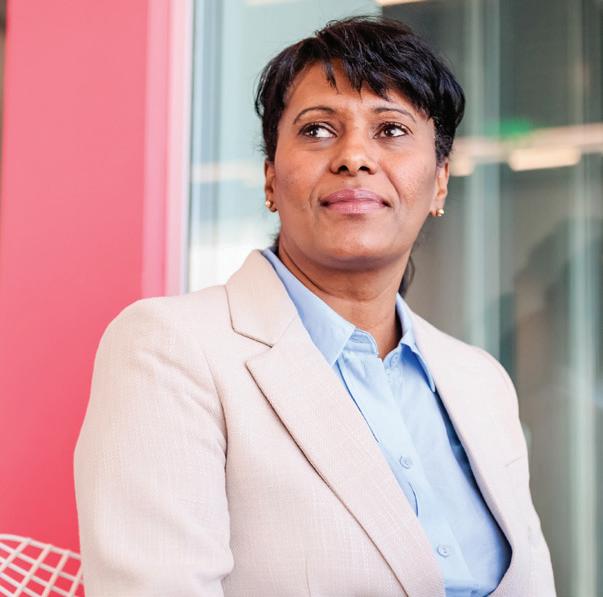
Beyene is on her way to being one of the 900 MSU Denver students whom the innovative program aims to graduate by 2026. The program provides personal, professional, academic and financial support for Colorado residents who are on track to graduate by May 2026, have been out of college for at least two semesters and can maintain a 2.0 GPA. Students must also prove that they have been negatively impacted by the pandemic.
Those looking to explore a new career or add more skills to their professional toolbox should check out MSU Denver’s Career Launchpad. The program offers affordable online introductory classes in multiple high-demand subject areas.
Students who complete a course get a digital badge to include on their résumé or LinkedIn page, and if they choose, they can convert the class to credit and work toward an MSU Denver credential or full bachelor’s degree.
The program can also be a great way to learn additional skills in their chosen field.
Emilee Vuksta, workforce projects manager at the Colorado Rural Health Center, already has a master’s in Health Administration. But when her office partnered with MSU Denver through a grant to recruit rural health care workers, Vuksta signed up for a Health Navigation Fundamentals class.

“It’s a well-rounded course and covered a lot of good topics for just getting to understand the field,” Vuksta said. “I thought it was really a great foot in the door.”
MSU Denver is one of Colorado’s top universities for transfer students, who make up about 50% of its student body. And for good reason.
Transfer student Maria Dos Santos Oliveira, who works as a peer mentor in the Transfer and Adult Student Success program, said the University’s wraparound services and focus on nontraditional students provide a positive experience for transfer students, especially those focused on getting into the workforce.

“I feel like MSU Denver prepares us very well,” said Dos Santos Oliveira, who is working toward a degree in Business Management. “Because there are things like the (Classroom to) Career Hub, and we are constantly receiving emails about career fairs and workshops. The University does a great job giving us all the right resources.”
transfer student experience.
 MATT WATSON
MATT WATSON
U.S. Rep. Brittany Pettersen, a 2006 Political Science graduate from Metropolitan State University of Denver, in November became the first Roadrunner elected to represent Colorado in Congress. She and another MSU Denver alumna, Rep. Kat Cammack of Florida, are two of a record 128 women serving in the U.S. House of Representatives.
RED spoke with Pettersen about the value of education, her career in politics and her legislative priorities.
Why are you such a proponent of public schools? My family started off as a regular family with regular problems. Then my mom, like so many people, was overprescribed opioids. She became wildly addicted when I was 6 years old. So my brothers and I relied on our schools. School was where adults were our mentors and believed in us. When I think about where taxpayer dollars should go, it’s really critical services like schools. Those are the fundamental things that we invest in that change the likelihood of success for so many people. MSU Denver is an important part of my story too. It was the school that made the direction that I wanted to go possible. I am thankful for the work MSU Denver does to change students’ lives like it did for me.
How did you get started in politics? I never thought I was going to run for office. I started working for candidates and issues I believe in, and when a (Colorado House of Representatives) seat opened up in 2012 in my community, a lot of people asked me to run. It was the scariest thing I’ve ever done — definitely scarier than running for Congress. It was a very tough race, and I was pitched as a guaranteed loss, but on election night I won by 10 points.
What are you most proud of from your decade in the Colorado legislature? There are so many things, but the most personal for me is my work and leadership on behavioral health issues. When I was fighting to save my mom’s life and seeing firsthand how decimated the system was, I felt a responsibility to be a voice for the people who are always left behind.
What are your top priorities in Congress? Right now, it’s recovery from the pandemic as families continue to struggle with rising costs. Within that is affordable housing, access to child care and investment in the workforce. And we need to actually invest in higher education so that it’s affordable for students.

Life put hurdles in Maya Ries’ path. Her first college experience didn’t go as planned. She struggled academically, dropped out and subsequently faced mental health struggles, unhealthy relationships and lackluster jobs. Despite the challenges, Ries found her way back to the classroom — and the track — at Metropolitan State University of Denver. In her first race in six years, the nontraditional student set a school record. She’s since become the fastest hurdler in the University’s history, breaking her school record eight times.





